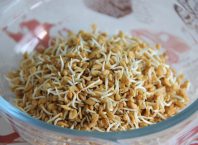Table of Contents
Cauliflower is one of the healthiest foods on earth. It’s high in antioxidants and phytochemicals, which help fight disease. It is also an excellent source of potassium, phosphorus, and B vitamins.
It contains a number of antioxidants, including glucoraphanin and sulforaphane, which may inhibit oxidative stress. These antioxidants help prevent cancer and cardiovascular disease. The phytochemicals in cauliflower can also help reduce chronic inflammation. They also help regulate insulin and blood sugar levels.
The phytochemicals in cauliflower also help protect your nervous system. They can lower your risk of Alzheimer’s, stroke, and other neurological disorders. They also promote the growth of nerve cells.
The sulforaphane in cauliflower may also reduce blood pressure. It can also promote HDL cholesterol, which improves cardiovascular health.
What is Cauliflower?
Originally from Asia, cauliflower has been popular in Europe since the 1500s. In the mid-16th century, cauliflower gained popularity in France. During the 1900s, Americans began growing cauliflower.
Cauliflower has many culinary applications. You can use it to replace high-carb foods in several recipes. You can also pickle or steamed it. You can even roast it and serve it with paprika.
Cauliflower is rich in antioxidants. These compounds can help prevent inflammation and maintain cellular health. They may also help keep your cholesterol levels in the proper range. They may also lower the risk of heart disease and some cancers. They may also boost your immune system.
One of the most important vitamins and minerals in cauliflower is vitamin C. This vitamin can increase hemoglobin production and help you absorb iron more efficiently. It can also protect you from UV radiation. It can also improve your eye health.
Another important nutrient in cauliflower is fiber. Fiber reduces inflammation and helps with indigestion. It also feeds healthy bacteria in your digestive tract.
Other beneficial nutrients in cauliflower include glucosinolates. These compounds protect cells from damage and have antibacterial, antiviral, and anti-inflammatory effects. They are also essential for repairing cell membranes.
Glucosinolates may also be helpful in preventing respiratory papillomatosis. This condition is caused by the human papillomavirus. The virus can affect the vocal cords, bronchi, and lungs.
Other benefits of cauliflower include its ability to boost immunity. It contains carotenoids, which help boost your immune system.

Nutrition Facts About Cauliflower
| Nutrient | Value |
| Water [g] | 92.07 |
| Energy | 25 |
| Energy [kJ] | 104 |
| Protein [g] | 1.92 |
| Total lipid (fat) [g] | 0.28 |
| Ash [g] | 0.76 |
| Carbohydrate, by difference [g] | 4.97 |
| Fiber, total dietary [g] | 2 |
| Sugars, total including NLEA [g] | 1.91 |
| Glucose (dextrose) [g] | 0.94 |
| Fructose [g] | 0.97 |
| Calcium, Ca [mg] | 22 |
| Iron, Fe [mg] | 0.42 |
| Magnesium, Mg [mg] | 15 |
| Phosphorus, P [mg] | 44 |
| Potassium, K [mg] | 299 |
| Sodium, Na [mg] | 30 |
| Zinc, Zn [mg] | 0.27 |
| Copper, Cu [mg] | 0.04 |
| Manganese, Mn [mg] | 0.16 |
| Selenium, Se [µg] | 0.6 |
| Fluoride, F [µg] | 1 |
| Vitamin C, total ascorbic acid [mg] | 48.2 |
| Thiamin [mg] | 0.05 |
| Riboflavin [mg] | 0.06 |
| Niacin [mg] | 0.51 |
| Pantothenic acid [mg] | 0.67 |
| Vitamin B-6 [mg] | 0.18 |
| Folate, total [µg] | 57 |
| Folate, food [µg] | 57 |
| Folate, DFE [µg] | 57 |
| Choline, total [mg] | 44.3 |
| Lutein + zeaxanthin [µg] | 1 |
| Vitamin E (alpha-tocopherol) [mg] | 0.08 |
| Tocopherol, gamma [mg] | 0.2 |
| Vitamin K (phylloquinone) [µg] | 15.5 |
| Fatty acids, total saturated [g] | 0.13 |
| 10:0 [g] | 0.02 |
| 15:0 [g] | 0 |
| 16:0 [g] | 0.09 |
| 17:0 [g] | 0 |
| 18:0 [g] | 0.01 |
| 20:0 [g] | 0 |
| 22:0 [g] | 0 |
| 24:0 [g] | 0 |
| Fatty acids, total monounsaturated [g] | 0.03 |
| 14:1 [g] | 0 |
| 16:1 [g] | 0 |
| 16:1 c [g] | 0 |
| 18:1 [g] | 0.03 |
| 18:1 c [g] | 0.03 |
| 24:1 c [g] | 0 |
| Fatty acids, total polyunsaturated [g] | 0.03 |
| 18:2 [g] | 0.02 |
| 18:2 n-6 c,c [g] | 0.01 |
| 18:2 CLAs [g] | 0 |
| 18:3 [g] | 0.02 |
| 18:3 n-3 c,c,c (ALA) [g] | 0.02 |
| Phytosterols [mg] | 18 |
| Tryptophan [g] | 0.02 |
| Threonine [g] | 0.08 |
| Isoleucine [g] | 0.07 |
| Leucine [g] | 0.11 |
| Lysine [g] | 0.22 |
| Methionine [g] | 0.02 |
| Cystine [g] | 0.02 |
| Phenylalanine [g] | 0.07 |
| Tyrosine [g] | 0.05 |
| Valine [g] | 0.13 |
| Arginine [g] | 0.09 |
| Histidine [g] | 0.06 |
| Alanine [g] | 0.12 |
| Aspartic acid [g] | 0.18 |
| Glutamic acid [g] | 0.26 |
| Glycine [g] | 0.07 |
| Proline [g] | 0.07 |
| Serine [g] | 0.09 |
| Sources include: USDA |
Nutritional Health Benefits Of Cauliflower
1. Cauliflower Might Improve Cardiovascular Health
This vegetable contains several antioxidants that are powerful in combating oxidative stress. It can also help reduce inflammation. It is also packed with protein and dietary fiber. It has high amounts of vitamins and minerals.
Glucosinolates, an ingredient in cauliflower, have been found to slow the growth of certain cancers. They can also promote healing of colon tissue. They also improve metabolic functions. Moreover, they can prevent the hardening of arteries.
In addition, cauliflower has anti-inflammatory properties. It may help to regulate blood pressure, reduce the incidence of indigestion, and improve digestion. It may also lower the risk of diabetes and liver disorders.
It contains a variety of phytonutrients, including sulforaphane. This compound can help to protect your brain and retina. It may also promote the production of HDL, or good cholesterol. It can also slow the development of age-related cognitive decline.
Cauliflower is an excellent source of choline, a nutrient essential for the efficient function of the brain. It is also effective in repairing cell membranes. The folic acid in the food can help to protect your fetus during pregnancy. The vitamin K in cauliflower also helps to improve calcium absorption.
In addition, cauliflower is a great source of potassium and manganese. Both of these minerals are important for maintaining the proper balance of electrolytes in the body. This can be crucial for regulating blood pressure, nerve impulses, and muscle contractions.
It also contains vitamin C, which has been shown to be an effective antioxidant. Vitamin C can also aid in inhibiting infection.
2. Cauliflower May Have Anticancer Potential
Phytochemicals may play a role in the anticancer capabilities of cauliflower. In particular, glucosinolates and other compounds in the plant have been shown to inhibit cancer cell growth. Other studies have shown that phytochemicals may help protect against certain types of cancers, such as breast cancer. The American Cancer Society recommends a diet rich in fruits and vegetables.
While cauliflower’s health benefits have been studied, researchers believe more research is needed to understand the potential of these nutrients in the fight against cancer.
Glucosinolates are sulfur-rich molecules that play a part in inhibiting the growth of tumors. They are thought to work by activating the sulforaphane in your body when they come in contact with your myrosinase.
Another interesting nutrient is Indole-3-carbinol, a compound that has been shown to inhibit the growth of cancer cells. These two compounds are also found in cruciferous vegetables such as broccoli, cabbage, and Brussels sprouts. The inositol in oat bran may also have cancer-fighting potential.
3. Cauliflower Can Improve Bone Health
Besides providing you with a wide variety of vitamins and minerals, cauliflower can improve bone health. It is high in calcium and dietary fiber. These two important nutrients are necessary to keep your bones strong. They also promote healthy digestion. This helps reduce the risk of colon cancer.
Cauliflower is a great source of vitamin K, a nutrient that is essential for bone formation. Studies have shown that people who are deficient in vitamin K have a higher risk of bone fractures.
4. Cauliflower May Prevent Oxidative Stress
Whether you are looking for a healthy alternative to other foods, or want to increase your nutrient intake, cauliflower can be a beneficial addition to your diet. It contains a number of nutrients, including antioxidants, that can help your body maintain optimal cholesterol levels and detoxify your body.
Oxidative stress is a condition that occurs when the body is not able to fight off free radicals. These radicals damage cells and tissue and can lead to organ damage and premature aging. Antioxidants are believed to keep the body healthy by countering the cellular effects of free radicals. They also can help your body maintain proper electrolyte balance.
The antioxidant power of cauliflower helps to prevent oxidative stress and inflammation. This translates to a healthier cellular structure and better bone health. It can also protect against heart disease. It can also support your immune system and promote digestive health.
5. How Cauliflower Can Help Detoxify the Body
Whether you are eating cauliflower for weight loss or detoxing your body, this vegetable offers you some powerful benefits. It contains antioxidants and enzymes that help remove harmful substances from your system.
These nutrients also help your body fight off diseases. They strengthen your defenses and make it more resistant to free radicals. They prevent cancer and autoimmune reactions. They also keep your bones strong. They can reduce the risk of heart disease. They are also good for your brain, which is why it is important to include them in your diet.
Another benefit of eating cauliflower is its high fiber content. It helps promote bowel regularity and fullness. It also feeds your gut bacteria, which helps regulate inflammation in your body. It is a good source of Vitamin K, which supports detox pathways in your liver. It is a great addition to your diet if you have digestive issues.
The high fiber content of cauliflower may also reduce the risks of obesity and digestive disorders. It also helps control blood pressure. The low calories in this vegetable make it an ideal food for a healthy eating plan.

6. Cauliflower May Aid in Skin Care
Adding cauliflower to your diet may benefit your skin. This nutritious vegetable is high in fiber and antioxidants. Both of these nutrients protect your skin from free radical damage. In addition, cauliflower contains vitamin C, which improves collagen production. This vitamin also strengthens your immune system and helps prevent infections.
7. Cauliflower May Help Manage Diabetes
Whether you have diabetes or are at risk for developing the disease, you should know about the health benefits of cauliflower. It is not only an excellent source of Vitamin C, but also has high levels of protein, fiber and potassium. It also contains antioxidants and sulfur compounds, which help protect you from cancer-causing cells.
Using cauliflower instead of white rice in your diet can help you keep your blood sugar levels under control. It is a great way to replace grain-based foods and will also keep you full for longer. The fibre content in cauliflower also slows down digestion, preventing sudden releases of sugar.
Cauliflower may also help you lose weight. If you are overweight, cutting back on your intake of sugar-rich foods will help you slim down. Similarly, consuming cauliflower at meals after a workout will also help you lose weight. Adding boiled cauliflower to salads is a great addition.
If you have diabetes, it is important to remember to eat plenty of fresh fruits and vegetables. These can help regulate your blood sugar levels and keep you in a healthy weight range. A special meal plan will also help you achieve this.
The glycemic index (GI) of cauliflower is 10 out of 100, which means that it is safe for diabetics. It also has a high water content, which will help you stay hydrated.
Besides being a good source of vitamins, proteins and fibre, cauliflower also contains important minerals such as calcium, magnesium and phosphorous. These minerals are vital for regulating blood sugar levels. In addition to these, cauliflower is a good source of antioxidants, which can help prevent heart disease.
8. Cauliflower Might Help Prevent Stomach Disorders
Adding cauliflower to your diet can help you maintain a moderate weight and improve your overall health. It is a very low calorie, nutritious vegetable that is also rich in fiber, which supports digestion.
Although cauliflower is low in fat, it contains purines, which can cause digestive problems. These compounds can be broken down in the body into uric acid, which can lead to kidney stones. Therefore, it is best to consult a doctor before consuming cauliflower.
One serving of cauliflower has 23 calories and 2.3 grams of fiber. It is a good source of potassium and magnesium. It is also a good source of vitamin C, which is a powerful immune system booster.
9. Cauliflower May Help Reduce Hypertension
Adding cauliflower to your diet may lower your blood pressure. This is because of the antioxidants in the vegetable.
The compound sulforaphane is found in cauliflower. Sulforaphane is a chemical that helps to reduce inflammatory damage. It is also thought to lower cholesterol levels.
If you have a family history of hypertension or cardiovascular disease, you may want to include cauliflower in your diet. A study found that patients who drank broccoli juice experienced a significant decrease in blood pressure. This might be because of the high concentration of potassium.
10. Cauliflower May Slow Down the Progression of Respiratory Problems
Among the many benefits of cruciferous vegetables, one of them is the ability to slow down the progression of respiratory problems. Studies have shown that cauliflower is rich in a compound called indole 3-carbinol. This compound is an anticancer compound that is found in cruciferous vegetables. Having a diet high in vitamin C can also improve lung health.
Some other benefits of cruciferous vegetables include the ability to improve gastrointestinal health. In particular, cauliflower contains a component known as indole-3-carbinol, which is believed to be an important factor in the prevention of chronic inflammatory bowel disease. This disease affects the lining of the digestive tract, and bacterial organisms are the main cause. Other factors, such as coccidiosis, may contribute to its development.
Health Benefits of Cauliflower During Pregnancy
During pregnancy, it is essential to eat foods rich in calcium and iron. Including cauliflower in your diet helps maintain a healthy level of these nutrients in your body. This helps maintain the growth and development of the fetus.
The calcium and potassium in cauliflower help keep your blood pressure and blood flow at normal levels. It also prevents dehydration.
The fiber content of cauliflower also helps prevent constipation. Having a regular intake of cauliflower is recommended to ensure your digestive system works properly. It is also beneficial for maintaining cholesterol at a healthy level.
Cauliflower is also a good source of folate. It is important for the development of the fetus and for the digestive system. A lack of this vitamin can lead to abnormalities during pregnancy.
If you are pregnant, you should eat at least 85 milligrams of vitamin C a day. Vitamin C boosts your immune system and protects you from infection. It also helps fight free radicals in your blood. It can reduce your risk of gestational diabetes.
It is also a good source of phosphorus. Phosphorus is necessary for building strong bones and teeth. It is also necessary for the development of a child’s muscles and skeletal system.
Health Benefits of Cauliflower Rice
Whether you’re looking to cut back on your carbs or just want to get more vegetables into your diet, cauliflower rice is a good option. This trendy carb conscious alternative is full of antioxidants and fibre. The best part is that it’s very easy to prepare.
Cauliflower rice is a great substitute for traditional white rice. It’s also a good source of vitamins and minerals. It’s especially rich in vitamin C, which can help to fight off infections and keep your skin healthy.
It is also a good source of thiamine, iron and riboflavin. It is also rich in fiber, which helps to reduce your hunger pangs. It’s important to consume fiber for heart health and to keep your digestive tract functioning properly.
It’s also a good source of potassium, which can help to regulate your sodium levels in your system. This mineral is also important for your bones.
It’s full of antioxidants, which can protect your body from free radicals. Free radicals are particles that are loose oxygen molecules that can damage your cells. Some scientists believe that free radicals play a role in cancer and heart disease.
Some studies have also shown that cauliflower rice can help to lower your risk of developing several different diseases. Researchers believe that it can reduce your risk of dying from cardiovascular disease. It may also help to promote fat burning thermogenesis, which can reduce your risk of obesity.
It’s not only a good source of vitamins and minerals, but cauliflower also contains a compound called sulforaphane. Sulforaphane can help to prevent cataracts, vision problems, and macular degeneration. It also helps to shield your skin from UV light.
Health Benefits of Broccoli and Cauliflower
Those who are trying to cut down on calories or lose weight should definitely consider broccoli and cauliflower as healthy choices. They are both packed with important vitamins, minerals, and health-boosting compounds. These two cruciferous vegetables are not only delicious on their own, but they make a great addition to soups, casseroles, and pasta salads.
In addition to helping to lower cholesterol, these two cruciferous veggies are also known to decrease your risk of developing cancer. Studies have shown that a high intake of these vegetables may reduce your risk of heart disease, colorectal cancer, and lung cancer. They are also known to protect against breast and prostate cancer.
These two vegetables are both excellent sources of fiber. Fiber helps to lower your cholesterol and maintain regularity. In addition, it can help you to control blood sugar levels.
Both broccoli and cauliflower are considered part of the Clean Fifteen, which is a list of fruits and vegetables grown without the use of pesticides. These two cruciferous veggies are also good for your digestive system. These types of vegetables are low in carbohydrate, and they contain many phytonutrients that help to prevent certain diseases.
Both of these vegetables are rich in antioxidants. These compounds fight oxidative stress and help to reduce inflammation. They also help to maintain cell health and cellular function. Having a healthy body is vital to a long and healthy life.
These cruciferous vegetables are a rich source of folate, which is important for the formation of red blood cells. They are also a good source of calcium, which is necessary for bone health. They are also rich in magnesium and zinc.
Health Benefits of Cauliflower Leaves
Whether you’re looking for a tasty vegetable to add to your salad, or you’re interested in making a quick side dish, cauliflower leaves are a great way to boost your diet. They are full of nutrients, including vitamin C, potassium, and calcium.
In addition to their nutritional value, these greens are also great for keeping your eyesight in tip top shape. They contain antioxidants, which help protect your retina and other vital cells from the damaging effects of free radicals. They also have been found to reduce inflammation.
Several studies have shown that eating dark green leaves lowers the risk of some cancers, and helps to improve your heart health. In addition, they are also rich in glutathione, a potent antioxidant. This antioxidant helps to support the rebuilding of the gut lining and prevents chronic inflammation.
If you’re interested in adding cauliflower leaves to your diet, consider blending them into soups or smoothies. This will help to retain the nutrients and also increase the flavor of your recipes.
Aside from the fact that they’re high in fiber, cauliflower leaves are also loaded with iron and folate. They also supply thrice as much calcium as cauliflower. In addition, they provide a good amount of vitamins A and C, as well as selenium. They’re a great source of protein and essential fatty acids.
In addition to their nutrient content, cauliflower leaves are also rich in antioxidants. These vitamins and minerals can help to protect against the harmful effects of free radicals. This can lessen your risk of cardiovascular disease, macular degeneration, cataracts, and arthritis.
Health Benefits of Cauliflower Pizza Crust
Choosing cauliflower pizza crust can be a great way to reduce your carb intake. Cauliflower is a cruciferous vegetable and it has a high antioxidant content. It also has anti-inflammatory properties. This makes it a good choice for those with digestive disorders and prediabetes.
The nutrient density of cauliflower is also high. It is a low-carb vegetable that is high in fiber, making it a healthy alternative to wheat or other grains. The nutrients in vegetables help to reduce the risk of diabetes, heart disease, and obesity.
It also has anti-inflammatory properties, which reduce inflammation and can help to slow down cancer cell proliferation. It also has antioxidants that protect against breast, prostate, and lung cancer.
It is also lower in calories than traditional pizza crust. A serving of cauliflower pizza crust contains about ten percent less sugar and half the calories of other gluten free pizzas. It is also low in fat and sodium. It is a good choice for people with celiac disease and a gluten free diet.
It is important to look at the nutritional values of cauliflower pizza crust before buying it. Most brands do not list how much cauliflower is in their product. They may list the first ingredient as cauliflower and then use a starch or nut flour. The starch or nut flour can be corn, potato, or tapioca starch.
The Veggie Pizza on Cauliflower Crust contains 13 grams of carbohydrates and 4 grams of fat. It is a good choice for those who are following a low-carb or ketogenic diet.
Health Benefits of Cauliflower Mushroom
Several studies have shown that cauliflower mushroom is highly effective in treating cancer. This edible fungus has been used for centuries in traditional Japanese cooking.
The mushrooms are high in beta-glucan content, which makes them an excellent medicinal supplement. In addition, they contain vitamin K, a fat-soluble vitamin that helps the body clot blood. It also helps prevent bone calcification. It is important for the skeletal structure of the human body to stay healthy. Its anti-inflammatory properties help prevent high blood pressure and cholesterol levels from getting out of control.
It is also helpful in treating diabetes, wound healing, and allergy symptoms. Its high antioxidant content protects the cells from damage.
It also has anti-microbial, anti-carcinogenic, and anti-allergic properties. It can be found in many parts of the world, including the United States, Australia, and Korea.
In Japan, the mushrooms are called hanabiratake. The white “head” of the cauliflower is often cooked, while the yellow version is eaten raw. Both are used in different recipes. It is important to wash the cauliflower thoroughly before eating.
The mushrooms have an earthy flavor and are thin, paper-like. They are usually consumed in Asian cuisines, but they are also widely available in stores across the world.
The cauliflower mushroom is popular in North America and Europe. It is an excellent source of fiber, which helps the digestive system. It has a low calorie count, so it can be used in a variety of recipes.
Health Benefits of Cauliflower Pizza
Adding cauliflower to a pizza can be an excellent way to cut carbs. The vegetable is high in dietary fiber, which helps to keep you full. It also helps to reduce inflammation. You can enjoy cauliflower pizza with a variety of toppings. The best part is, it can be made at home.
The dietary fiber in cauliflower is an excellent source of antioxidants, which help to fight against heart disease and cancer. It also promotes digestion and reduces constipation. The glucosinolates in the vegetable slow the growth of cancer cells. It can protect you from prostate and lung cancer.
The fiber in cauliflower also helps to regulate blood sugar levels and prevent cardiovascular problems. It’s a low-carb alternative to legumes. The choline in the vegetable is a building block for acetylcholine, which is an important chemical messenger for the nervous system. It helps the brain regulate memory, muscle control, and mood. It’s also necessary for healthy cell membranes and can help to prevent dementia, liver disease, and Alzheimer’s disease.
Many cauliflower products are gluten-free, making them an ideal choice for people with celiac disease or other gluten-related disorders. However, it’s still important to check the label on any product you buy to make sure it’s gluten-free.
While cauliflower pizza is an excellent option for reducing carbohydrates in your diet, it’s not completely healthy. It’s still loaded with calories, especially when you add toppings. It’s best to avoid it if you’re looking to lose weight.
Health Benefits of Cauliflower Stems
Cauliflower can be eaten raw or cooked. The most common way to prepare it is to steam or broil. The stems should be sliced into bite-sized pieces. A whole head of cauliflower should be kept in the refrigerator for four to seven days. After that, it should be thrown away.
In addition to being a great source of fiber, cauliflower is packed with a number of antioxidants. These antioxidants protect the body from oxidative stress, which is a key contributor to the development of cancer. In addition, cauliflower has been shown to reduce the risk of heart disease and colitis. It also protects against the harmful effects of ultraviolet radiation.
In addition, cauliflower may boost the immune system and promote eye health. The high fiber content of the stems helps in digestion and elimination of toxins from the body. It also helps to protect the stomach lining.
The Side Effects of Cauliflower
Among the vegetables, cauliflower has a variety of health benefits. However, it also has some side effects. It is best to consult your doctor before you eat cauliflower. If you are taking medications for diabetes, gout, or a blood thinner, you should avoid cauliflower. It may even interfere with your treatment.
Aside from being a good source of fiber, cauliflower is also a very low calorie food. It contains a lot of vitamins, minerals, and antioxidants.
However, you should be aware that it can cause digestive problems. This is because it is high in fiber. If you do not digest it properly, you will experience gas, bloating, and other intestinal disorders. It can also interfere with blood clotting. In the case of a clot, it can be fatal.
Conclusion
Cauliflower is an excellent source of choline. This nutrient is essential for your brain and muscle function. It is also necessary for DNA synthesis. It’s a key ingredient in acetylcholine, a chemical messenger nerve cells use to communicate.
Choline is also important for memory and cognition. It helps your nervous system to regulate your memory and mood. It also helps your muscles to control their movements. If you’re on a low-carb diet, cauliflower may be a great substitute for carbohydrates. It’s a good source of magnesium, too.
Another important benefit of cauliflower is its ability to help you lose weight. It’s packed with fiber, which helps to keep you full. It can also help to prevent constipation and stomach ulcers.















